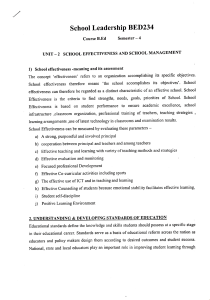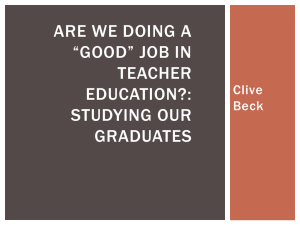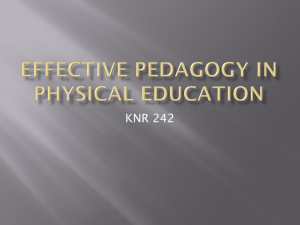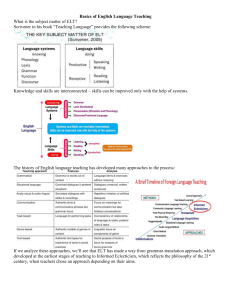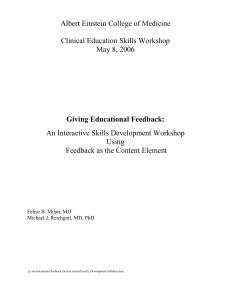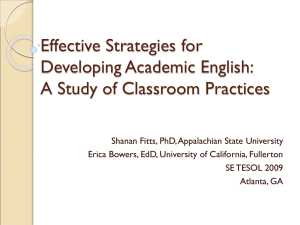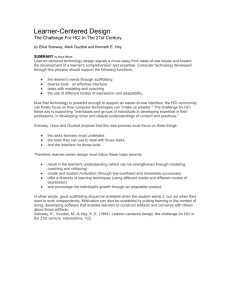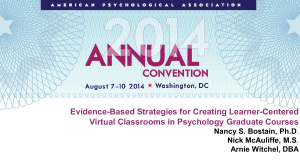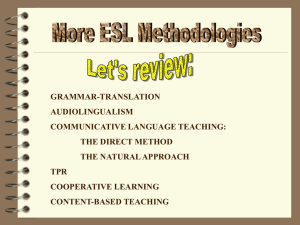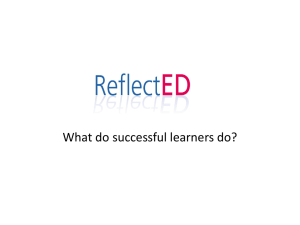Constraints on the Development of a Learner
advertisement
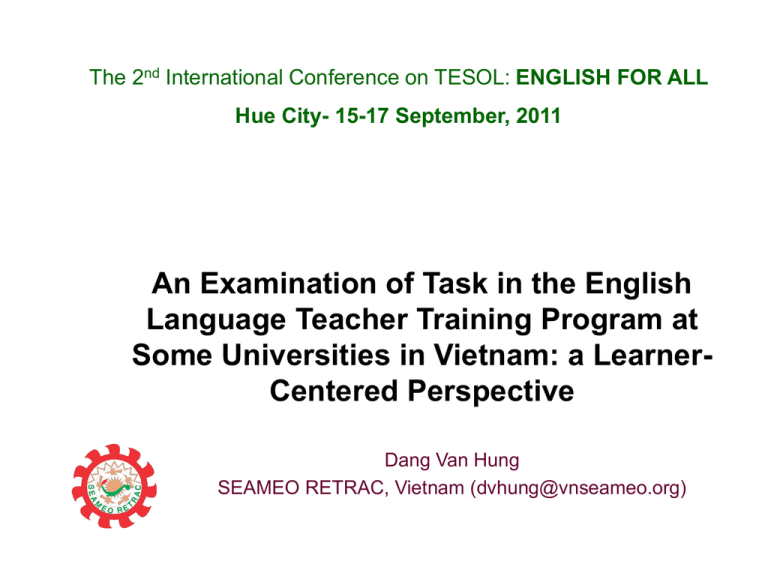
The 2nd International Conference on TESOL: ENGLISH FOR ALL Hue City- 15-17 September, 2011 An Examination of Task in the English Language Teacher Training Program at Some Universities in Vietnam: a LearnerCentered Perspective Dang Van Hung SEAMEO RETRAC, Vietnam (dvhung@vnseameo.org) Outline • • • • • • Introduction Background Learner-centered instruction Research methodology Findings and discussion Conclusion and implications Introduction • Aims: This paper aims to examine Task as one of the four key components of the teaching and learning process in the English teacher education program in Vietnam on a learner-centred perspective. • Definition of Task: For my purposes, the notion of task encompasses the whole learning program, from the curriculum outline, teaching materials to assessment and evaluation. A social constructivist model of the teaching – learning process (Williams and Burden, 1997) Context Teacher Learner Task Background • EFL teachers education in Vietnam – For lower secondary schools: 3 yr Program – For upper secondary schools: 4 yr Program • Entrance requirements – High school graduates – Meeting the minimum scores of entrance examination (including 3 exam papers: Mathematics, Vietnamese Language & Literature, and English) • Curriculum – 3-yr program (112 to 120 credit hours) – 4-yr program (134 to 142 credit hours) (1 credit hour = 15 class contact hours & 45 hours of individual study) Background KNOWLEDGE CREDITS GENERAL KNOWLEDGE 27 MATHS & NATURAL SCIENCES 2 BASIC KNOWLEDGE OF THE DISCIPLINE 9 FOUNDATION KNOWLEDGE OF THE DISCIPLINE 66 + knowledge of general linguistics 9 + cultural knowledge 11 + English language and skills 46 PROFESSIONAL/VOCATIONAL KNOWLEDGE 22 PRACTICUM 3 GRADUATION THESIS 5 Learner-centered instruction • Learner-centered education aims to create favorable conditions for educational goals - access, equity, quality and democracy - to be accomplished (NIED, 2003). • Characteristics – a stronger focus on the learner as an individual; – a corresponding shift from a focus on teaching to a focus on learners and learning; – consideration of differences in learning styles and learning strategies; and – various manifestations of humanism. (Hoven, 1999) Learner-centered instruction • Learner-centered instruction draws heavily upon constructivism with the assumption that deep learning occurs when learners are actively engaged in the construction of knowledge for themselves (Pulist, 2005) • Teachers are expected to understand their learners’ views, beliefs and needs and to support capacities already existing in the learners to bring about desired learning outcomes (Schuh, 2003). Learner-centered instruction • Learning goals are realized by active collaboration between the teacher and learners who have a shared knowledge of what learning means and how it can be best promoted within each individual learner by drawing on the learner’s own unique talents, capacities and experiences (McCombs, 1997) Research methodology • Conceptual framework: – Based the five primary constructivist principles • • • • • task authenticity interaction voice and ownership in the learning process knowledge construction process, and meta-cognition (Cunningham, Duffy, & Knuth, 1993) Research methodology • The research approach: essentially qualitative. • The data – Primary sources: • questionnaires to students and to teacher educators, • individual interviews with teacher educators and university leaders, • classroom observations • student focus-groups, and • case studies. – Secondary sources: • curriculum guidelines, course books, and conference and seminar proceedings Research methodology • Participants – 3rd & 4th yr EFL students – University lecturers – English department and university administrators • Sites – Ha Noi – Da Nang – Ho Chi Minh City Findings and discussion • Authenticity – Not adequately considered in the curriculum and learning materials: • the curriculum and learning materials are currently designed and developed without reference to students’ needs • lack of learner data in the learning materials • the learning materials of some subjects are out-ofdate and ill-structured • monotonous formats of learning tasks and lessons • repetition of topics and themes Findings and discussion • Interaction – Teacher-student relationships • lecturers do not work as mediators in helping students to perform the learning tasks effectively • lecturers taking a dominating role – Peer group relationships • working in groups and pairs is not enhanced due to: – Unfavorable classroom physical setting – Time consuming – Student learning styles Findings and discussion • Voice and ownership in the learning process: – Not appreciated • Prescribed curriculum • Teacher's dominating role • Teachers do not trust students' ideas • Students' lack of confidence • Students’ misconception of teachers’ authority Findings and discussion • Knowledge construction process – Sts are not involved in knowledge construction – Learning tasks and assessments are more product than process oriented. • Sts are not encouraged to pay due attention to the ongoing process • Sts are more concerned about the knowledge and skills they have to acquire and internalize. • Sts never received any feedback from their teachers for their examination papers • Self-assessment is neglected Findings and discussion • Meta-cognition – Few opportunities for sts to get involved in processes of reflecting on knowledge and its construction – Sts are not fully aware of effective learning methods or strategies – Learning how to learn is not included as an objective of training in the curriculum and learning materials. Conclusion and implications • Conclusion – Curriculum & tasks are • non authentic, irrelevant and alien to the students because they are designed and developed without reference to the students’ needs, preferences and interests. • The tasks are also non interactive with inadequate teacher mediation and only occasional and unsatisfactory team or group work. Conclusion and implications • The students’ voice and ownership in the learning process is not supported through task performance due to preset tasks and teachers’ dominant role in the teaching and learning process. • The tasks are product oriented => – the knowledge construction process and metacognition in task performance are not adequately practiced => » the students not being trained to learn how to learn, how to construct and refine meaning, nor how to reflect on the structure of the task, and on the structuring of their approaches to the task. Conclusion and implications • Implications – There should be changes at every level of the educational task, in terms of • aims and objectives of educational program • nature of curriculum, • function of learning content, and assessment. – To this end, • aims and objectives of educational programs must be clearly defined, inclusive, and comprehensive; and they must be known by all educators and students. Conclusion and implications • curriculum, in terms of content selection, pedagogy, learning materials, and learning tasks and activities, should be designed and developed with reference to learners’ needs and interests. • the content of learning must serve a dual purpose: providing learners with both a body of knowledge and skills for active learning. In other words, learning strategies should be incorporated into the content of language learning. Conclusion and implications • assessment should be both product- and processoriented; • test papers should be designed in ways that not only learned knowledge and skills but also students’ creative and critical thinking are taken into account; • different modes and forms of assessment (e.g., ongoing, end-of-semester tests; conventional tests, portfolios, etc.,) should be used; and • self-assessment should be encouraged.
